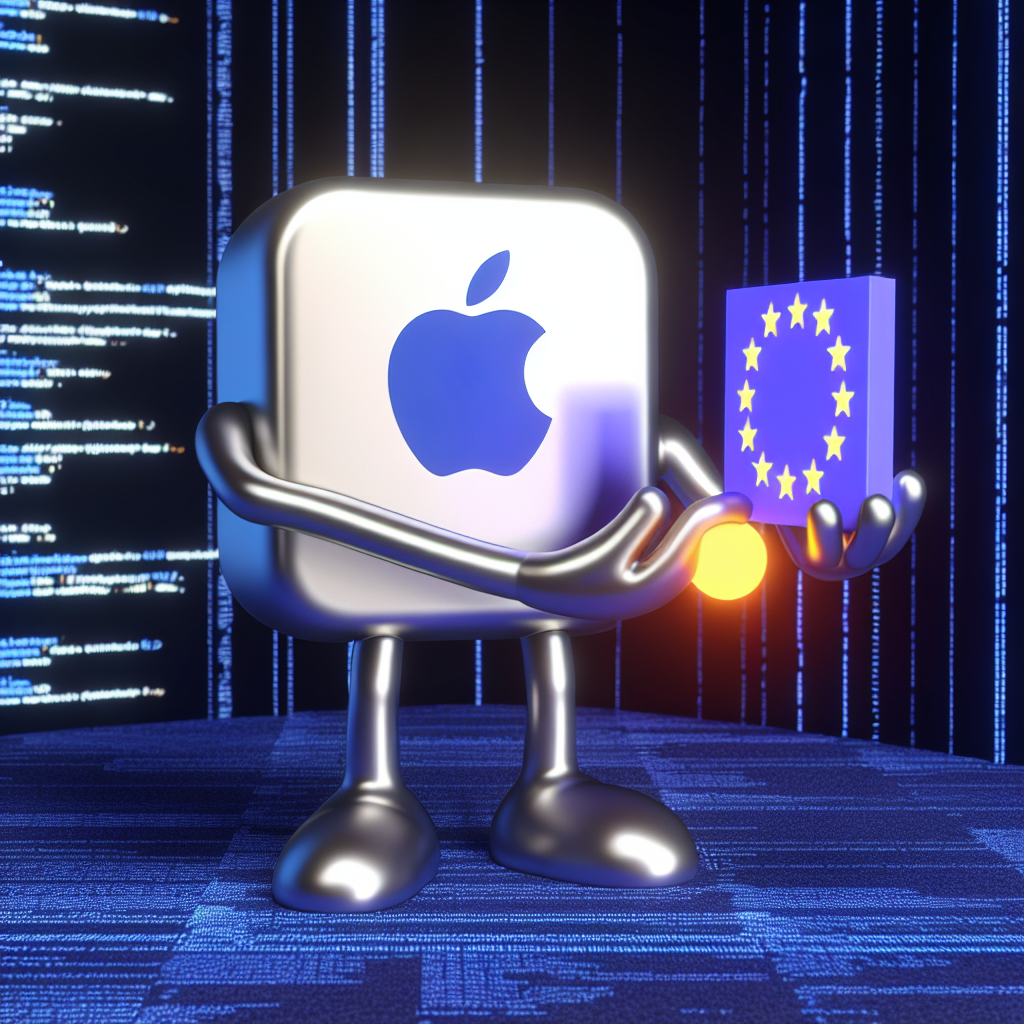Impact of the Digital Markets Act on Apple’s iPadOS
Apple’s iPadOS, the operating system specifically designed for iPads, has become a staple in the tech industry. With its sleek design, powerful performance, and a wide range of features, the iPad has gained a significant market share and a loyal customer base. However, with the recent introduction of the European Union’s Digital Markets Act (DMA), Apple’s iPadOS will have to comply with new regulations that aim to promote fair competition and protect consumers.
The DMA, which was proposed by the European Commission in December 2020, seeks to address the growing concerns over the dominance of tech giants in the digital market. It aims to create a level playing field for all businesses, regardless of their size, and ensure that consumers have access to a wider range of choices. While the DMA primarily focuses on online platforms, it also extends its reach to operating systems like Apple’s iPadOS.
One of the key provisions of the DMA is the prohibition of unfair practices by gatekeepers. Gatekeepers are defined as companies that have a significant impact on the market and act as intermediaries between businesses and consumers. Apple, with its dominant position in the tablet market, is considered a gatekeeper, and therefore, will have to comply with the DMA’s regulations.
Under the DMA, gatekeepers are required to provide fair and non-discriminatory access to their operating systems. This means that Apple will have to ensure that its iPadOS does not favor its own apps or services over those of its competitors. For example, if Apple pre-installs its own apps on iPads, it must also allow users to easily uninstall or replace them with alternative apps.
Furthermore, the DMA also prohibits gatekeepers from using data collected from their platform to gain an unfair advantage over their competitors. This means that Apple will have to be transparent about the data it collects from iPad users and how it is used. It will also have to provide third-party developers with access to the same data and functionalities that it provides to its own apps.
In addition to these requirements, the DMA also introduces stricter rules for mergers and acquisitions involving gatekeepers. This means that if Apple wants to acquire a company that operates in the digital market, it will have to notify the European Commission and undergo a thorough review process to ensure that the acquisition does not harm competition.
While these new regulations may pose some challenges for Apple, they also present an opportunity for the company to improve its relationship with developers and foster a more competitive environment. By complying with the DMA, Apple can demonstrate its commitment to fair competition and consumer protection, which could help rebuild trust with regulators and users alike.
In conclusion, Apple’s iPadOS will have to comply with the European Union’s Digital Markets Act, which aims to promote fair competition and protect consumers in the digital market. As a gatekeeper, Apple will have to ensure fair access to its operating system, avoid favoring its own apps, and be transparent about data collection. While these regulations may pose challenges, they also present an opportunity for Apple to improve its relationship with developers and foster a more competitive environment. By complying with the DMA, Apple can demonstrate its commitment to fair competition and consumer protection.
Key provisions of the Digital Markets Act applicable to iPadOS

Apple’s iPadOS, the operating system specifically designed for iPads, will have to comply with the European Union’s Digital Markets Act (DMA) as well. The DMA, which aims to regulate the behavior of large online platforms acting as gatekeepers, will have key provisions that will be applicable to iPadOS.
One of the key provisions of the DMA that will apply to iPadOS is the requirement for gatekeepers to allow users to install and use third-party applications and software. This means that Apple will have to ensure that iPad users have the freedom to choose and install applications from sources other than the App Store. Currently, Apple tightly controls the App Store, acting as the sole gatekeeper for applications on its devices. However, under the DMA, Apple will have to open up its ecosystem to allow for more competition and user choice.
Another important provision of the DMA that will affect iPadOS is the prohibition of self-preferencing. This means that Apple will not be able to give preferential treatment to its own apps and services over those of its competitors. Currently, Apple’s own apps, such as Apple Music and Apple Maps, are pre-installed on iPads and given prominent placement on the home screen. However, under the DMA, Apple will have to ensure that it treats its own apps and services on an equal footing with those of its competitors.
Furthermore, the DMA will also require gatekeepers like Apple to provide access to certain functionalities and data to third-party applications and services. This means that Apple will have to allow third-party apps to access certain features and data on iPads, such as the NFC chip or the Siri voice assistant. Currently, Apple tightly controls access to these functionalities, limiting third-party apps’ ability to fully integrate with the iPad ecosystem. However, under the DMA, Apple will have to provide fair and non-discriminatory access to these functionalities.
In addition to these provisions, the DMA will also establish a new regulatory framework for digital markets, including stricter oversight and enforcement powers for regulatory authorities. This means that Apple will have to comply with any additional requirements and regulations that may be imposed by the regulatory authorities under the DMA. This could include measures to ensure fair competition, prevent abusive behavior, and protect consumer rights.
Overall, the DMA will have significant implications for Apple’s iPadOS. The provisions of the DMA will require Apple to open up its ecosystem, allow for more competition and user choice, and treat its own apps and services on an equal footing with those of its competitors. Additionally, Apple will have to provide access to certain functionalities and data to third-party apps and comply with any additional regulations imposed by regulatory authorities. As the DMA aims to regulate the behavior of large online platforms acting as gatekeepers, it is clear that Apple’s iPadOS will have to comply with these regulations to ensure a fair and competitive digital market in the European Union.
Potential challenges and opportunities for Apple’s iPadOS under the Digital Markets Act
Apple’s iPadOS, the operating system specifically designed for iPads, has become a staple in the tablet market. With its sleek design, powerful performance, and a wide range of applications, the iPad has gained a loyal following of users. However, with the recent introduction of the European Union’s Digital Markets Act (DMA), Apple may face potential challenges and opportunities in ensuring compliance with this new legislation.
The DMA aims to regulate digital platforms and address concerns related to market dominance, unfair practices, and lack of competition. It seeks to create a level playing field for all market participants and protect the interests of consumers. While the DMA primarily focuses on large online platforms, such as Google and Amazon, it also has implications for operating systems like Apple’s iPadOS.
One potential challenge for Apple’s iPadOS under the DMA is the requirement for interoperability. The legislation aims to ensure that users can easily switch between different platforms and services without facing any technical barriers. This means that Apple may have to make changes to its operating system to allow for seamless integration with other platforms and services. This could be a significant undertaking for Apple, as it would require reevaluating its closed ecosystem approach and potentially opening up its operating system to third-party developers.
Another challenge for Apple could be the prohibition of self-preferencing. The DMA aims to prevent digital platforms from giving preferential treatment to their own products or services over those of their competitors. This could impact Apple’s ability to promote its own apps and services within iPadOS. Apple may need to ensure that its app store and other pre-installed apps do not receive any unfair advantages over competing offerings. This could lead to a more level playing field for app developers and potentially increase competition within the Apple ecosystem.
However, with challenges also come opportunities. The DMA could provide Apple with an opportunity to enhance its reputation as a company that prioritizes user privacy and data protection. The legislation includes provisions related to data access and data portability, which aim to give users more control over their personal information. Apple has already positioned itself as a leader in privacy with features like App Tracking Transparency and Privacy Nutrition Labels. By further aligning iPadOS with the DMA’s requirements, Apple can strengthen its commitment to user privacy and gain a competitive advantage over other platforms.
Additionally, the DMA could encourage innovation within the tablet market. With the requirement for interoperability, Apple may need to collaborate with other platforms and services to ensure seamless integration. This could lead to new and exciting partnerships that enhance the user experience and provide consumers with more choices. By embracing the DMA’s principles, Apple can position itself as a company that values collaboration and innovation, further solidifying its position in the tablet market.
In conclusion, Apple’s iPadOS will have to comply with the European Union’s Digital Markets Act, which presents both challenges and opportunities for the company. The requirement for interoperability and the prohibition of self-preferencing may require Apple to make significant changes to its operating system. However, by embracing these changes, Apple can enhance its reputation as a privacy-focused company and foster innovation within the tablet market. As the DMA continues to evolve, it will be interesting to see how Apple adapts and navigates the regulatory landscape to ensure compliance while maintaining its position as a leader in the tablet market.


